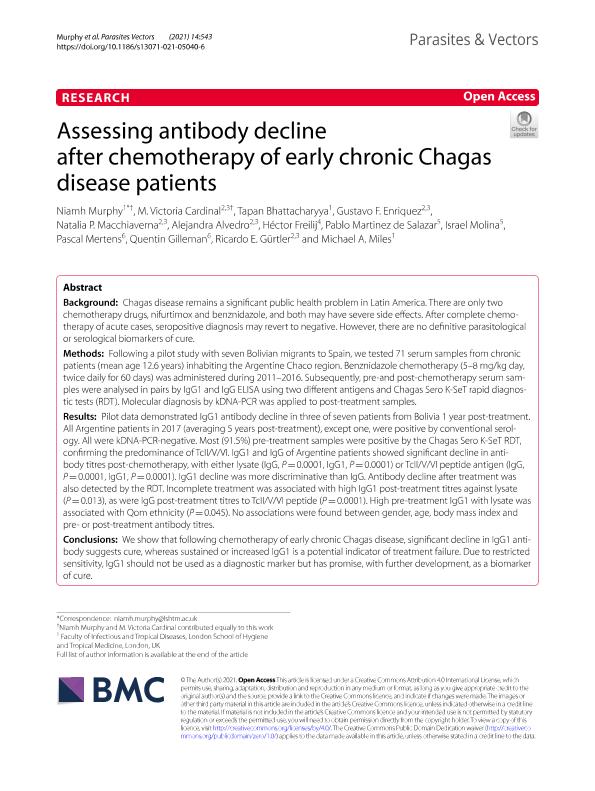Mostrar el registro sencillo del ítem
dc.contributor.author
Murphy, Niamh
dc.contributor.author
Cardinal, Marta Victoria

dc.contributor.author
Bhattacharyya, Tapan

dc.contributor.author
Enriquez, Gustavo Fabián

dc.contributor.author
Macchiaverna, Natalia Paula

dc.contributor.author
Alvedro, Alejandra

dc.contributor.author
Freilij, Héctor
dc.contributor.author
Martinez de Salazar, Pablo
dc.contributor.author
Molina, Israel
dc.contributor.author
Mertens, Pascal
dc.contributor.author
Gilleman, Quentin
dc.contributor.author
Gurtler, Ricardo Esteban

dc.contributor.author
Miles, Michael A.

dc.date.available
2022-12-16T15:58:04Z
dc.date.issued
2021-10
dc.identifier.citation
Murphy, Niamh; Cardinal, Marta Victoria; Bhattacharyya, Tapan; Enriquez, Gustavo Fabián; Macchiaverna, Natalia Paula; et al.; Assessing antibody decline after chemotherapy of early chronic Chagas disease patients; BioMed Central; Parasites and Vectors; 14; 1; 10-2021; 1-12
dc.identifier.issn
1756-3305
dc.identifier.uri
http://hdl.handle.net/11336/181555
dc.description.abstract
Background: Chagas disease remains a significant public health problem in Latin America. There are only two chemotherapy drugs, nifurtimox and benznidazole, and both may have severe side effects. After complete chemotherapy of acute cases, seropositive diagnosis may revert to negative. However, there are no definitive parasitological or serological biomarkers of cure. Methods: Following a pilot study with seven Bolivian migrants to Spain, we tested 71 serum samples from chronic patients (mean age 12.6 years) inhabiting the Argentine Chaco region. Benznidazole chemotherapy (5–8 mg/kg day, twice daily for 60 days) was administered during 2011–2016. Subsequently, pre-and post-chemotherapy serum samples were analysed in pairs by IgG1 and IgG ELISA using two different antigens and Chagas Sero K-SeT rapid diagnostic tests (RDT). Molecular diagnosis by kDNA-PCR was applied to post-treatment samples. Results: Pilot data demonstrated IgG1 antibody decline in three of seven patients from Bolivia 1 year post-treatment. All Argentine patients in 2017 (averaging 5 years post-treatment), except one, were positive by conventional serology. All were kDNA-PCR-negative. Most (91.5%) pre-treatment samples were positive by the Chagas Sero K-SeT RDT, confirming the predominance of TcII/V/VI. IgG1 and IgG of Argentine patients showed significant decline in antibody titres post-chemotherapy, with either lysate (IgG, P = 0.0001, IgG1, P = 0.0001) or TcII/V/VI peptide antigen (IgG, P = 0.0001, IgG1, P = 0.0001). IgG1 decline was more discriminative than IgG. Antibody decline after treatment was also detected by the RDT. Incomplete treatment was associated with high IgG1 post-treatment titres against lysate (P = 0.013), as were IgG post-treatment titres to TcII/V/VI peptide (P = 0.0001). High pre-treatment IgG1 with lysate was associated with Qom ethnicity (P = 0.045). No associations were found between gender, age, body mass index and pre- or post-treatment antibody titres. Conclusions: We show that following chemotherapy of early chronic Chagas disease, significant decline in IgG1 antibody suggests cure, whereas sustained or increased IgG1 is a potential indicator of treatment failure. Due to restricted sensitivity, IgG1 should not be used as a diagnostic marker but has promise, with further development, as a biomarker of cure. Graphical abstract: We show that following chemotherapy of early chronic Chagas disease, a significant decline in IgG1 antibody suggests cure, whereas sustained or increased IgG1 is a potential indicator of treatment failure. Due to restricted sensitivity, IgG1 should not be used as a diagnostic marker but has promise, with further development, as a biomarker of cure.
dc.format
application/pdf
dc.language.iso
eng
dc.publisher
BioMed Central

dc.rights
info:eu-repo/semantics/openAccess
dc.rights.uri
https://creativecommons.org/licenses/by/2.5/ar/
dc.subject
CHAGAS DISEASE
dc.subject
ELISA
dc.subject
IGG
dc.subject
IGG1
dc.subject
POST-TREATMENT
dc.subject
PRE-TREATMENT
dc.subject
RAPID DIAGNOSTIC TEST
dc.subject
SEROLOGY
dc.subject
TRYPANOSOMA CRUZI
dc.subject.classification
Biología Celular, Microbiología

dc.subject.classification
Ciencias Biológicas

dc.subject.classification
CIENCIAS NATURALES Y EXACTAS

dc.title
Assessing antibody decline after chemotherapy of early chronic Chagas disease patients
dc.type
info:eu-repo/semantics/article
dc.type
info:ar-repo/semantics/artículo
dc.type
info:eu-repo/semantics/publishedVersion
dc.date.updated
2022-09-28T16:29:07Z
dc.journal.volume
14
dc.journal.number
1
dc.journal.pagination
1-12
dc.journal.pais
Reino Unido

dc.journal.ciudad
Londres
dc.description.fil
Fil: Murphy, Niamh. University of London; Reino Unido
dc.description.fil
Fil: Cardinal, Marta Victoria. Universidad de Buenos Aires. Facultad de Ciencias Exactas y Naturales. Departamento de Ecología, Genética y Evolución. Laboratorio de Eco-Epidemiología; Argentina. Consejo Nacional de Investigaciones Científicas y Técnicas. Oficina de Coordinación Administrativa Ciudad Universitaria. Instituto de Ecología, Genética y Evolución de Buenos Aires. Universidad de Buenos Aires. Facultad de Ciencias Exactas y Naturales. Instituto de Ecología, Genética y Evolución de Buenos Aires; Argentina
dc.description.fil
Fil: Bhattacharyya, Tapan. University of London; Reino Unido
dc.description.fil
Fil: Enriquez, Gustavo Fabián. Consejo Nacional de Investigaciones Científicas y Técnicas. Oficina de Coordinación Administrativa Ciudad Universitaria. Instituto de Ecología, Genética y Evolución de Buenos Aires. Universidad de Buenos Aires. Facultad de Ciencias Exactas y Naturales. Instituto de Ecología, Genética y Evolución de Buenos Aires; Argentina
dc.description.fil
Fil: Macchiaverna, Natalia Paula. Consejo Nacional de Investigaciones Científicas y Técnicas. Oficina de Coordinación Administrativa Ciudad Universitaria. Instituto de Ecología, Genética y Evolución de Buenos Aires. Universidad de Buenos Aires. Facultad de Ciencias Exactas y Naturales. Instituto de Ecología, Genética y Evolución de Buenos Aires; Argentina
dc.description.fil
Fil: Alvedro, Alejandra. Consejo Nacional de Investigaciones Científicas y Técnicas. Oficina de Coordinación Administrativa Ciudad Universitaria. Instituto de Ecología, Genética y Evolución de Buenos Aires. Universidad de Buenos Aires. Facultad de Ciencias Exactas y Naturales. Instituto de Ecología, Genética y Evolución de Buenos Aires; Argentina
dc.description.fil
Fil: Freilij, Héctor. Gobierno de la Ciudad de Buenos Aires. Hospital General de Niños "Ricardo Gutiérrez"; Argentina
dc.description.fil
Fil: Martinez de Salazar, Pablo. Barcelona Institute For Global Health; España
dc.description.fil
Fil: Molina, Israel. Barcelona Institute For Global Health; España
dc.description.fil
Fil: Mertens, Pascal. No especifíca;
dc.description.fil
Fil: Gilleman, Quentin. No especifíca;
dc.description.fil
Fil: Gurtler, Ricardo Esteban. Consejo Nacional de Investigaciones Científicas y Técnicas. Oficina de Coordinación Administrativa Ciudad Universitaria. Instituto de Ecología, Genética y Evolución de Buenos Aires. Universidad de Buenos Aires. Facultad de Ciencias Exactas y Naturales. Instituto de Ecología, Genética y Evolución de Buenos Aires; Argentina
dc.description.fil
Fil: Miles, Michael A.. University of London; Reino Unido
dc.journal.title
Parasites and Vectors

dc.relation.alternativeid
info:eu-repo/semantics/altIdentifier/url/https://parasitesandvectors.biomedcentral.com/articles/10.1186/s13071-021-05040-6
dc.relation.alternativeid
info:eu-repo/semantics/altIdentifier/doi/http://dx.doi.org/10.1186/s13071-021-05040-6
Archivos asociados
